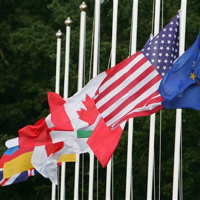Unpredictable Russia frightens the West
The meeting in Moscow with the Big 8 foreign affairs ministers is the last chance to confirm positions before the G8 summit. According to Western critics, Putin will have difficulty ensuring the success of the Petersburg negotiations. Russia is accused of neo-imperialism, but Moscow criticizes the Europeans and Americans for their double standards.

On Thursday, the Group of Eight foreign affairs ministers had a meeting in Moscow. These negotiations could be seen as the last stage in the preparations for the G8 summit in St Petersburg. The agenda is as follows: the war against terrorism and drug trafficking, the escalation of the conflict in the Middle East, and the collaboration between Russia and the West regarding energy.
“We propose, at the forthcoming G8 summit in July in St Petersburg, to elaborate an approach to solving the huge energy problem in particular. An approach that would ensure the interests of producer states, transit countries and consumer countries. This would probably suit us completely, because Russia can identify with all three roles,” declared Sergei Larov, the head of the Russian Ministry of Foreign Affairs, before the start of the negotiations in Moscow.
The distribution of energy resources from Russia has been of particular concern to Western politicians recently. European and American politicians are worried by Moscow’s harsh stance, with came through particularly strongly in the recent conflict with the Ukraine over gas.
Conservative newspaper Die Welt recently entitled one of its articles “Fear in the Face of Unpredictable Russia.”
In the opinion of critics, Russia, together with China, is trying to create an alternative power centre (of its own kind, gas analogue OPEC) based on the Shanghai Cooperation Organization. India, Pakistan and Iran are debating whether to become complete members of the SCO. The USA are determined to prevent this.
Nevertheless, as the article points out, this meeting presents leading industrialized countries with the unique opportunity to elaborate a joint, constructive approach in the face of the forthcoming revolutionary changes in worldwide energy markets. This is essential in order to restrain the greatly multiplied danger of conflict concerning the control and transport of energy resources, sums up Die Welt.
The West has reproached Moscow repeatedly for violating democratic freedom. One contentious topic is the abolition of the death penalty in Russia.
As PACE reporter Renatha Wolvend declared in a closed Moscow meeting, Moscow does not have the political backing for a complete abolition of this form of penalty. The Parliamentary Assembly of the Council of Europe has urged Russia to ratify the corresponding protocol of the European Convention on Human Rights. If Russia does not comply, some European deputies are demanding for its exclusion from the European Council.
In answer to this criticism, the spokesperson for the Council of the Federation, Sergei Mironov, has promised that Russia will “solve the problem” of the abolition of capital punishment.
In turn, the representative of the presidential administration, Vladislav Surkov, has blamed the West for the fact that Russian democracy is not fully developed.
“Our Russian model for democracy is called sovereign democracy. We want to be an open nation amid other open nations and cooperate with them according to fair rules, and not be controlled from the outside”, said Surkov. This statement was provided by the Rossiskaya Gazeta.
In the opinion of Surkov, the concept of “controlled democracy” with regard to Russia is a burden to “certain centres of global influence”.
Vladimir Ivanov
Pravda.Ru
Translated by Leila Wilmers
Discuss this article on Pravda.Ru English Forum
Subscribe to Pravda.Ru Telegram channel, Facebook, RSS!


